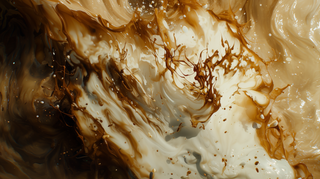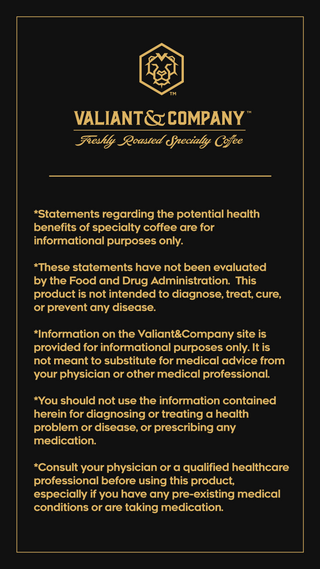FAQs
Our most frequently asked questions, click a question below for the answer.
If you still need help, please reach out to us.
Shipping & Returns
Orders ship the day they are roasted/packed and are generally delivered to customers in 3-5 business days in the USA. Please note that depending on where you live and during busy times, peak season and holidays, it may take 5-7 days or longer so appreciate your patience in advance. A tracking email will be sent to you so you can track your delivery date.
Yes! When you purchase more than $75 of coffee your shipping is 100% FREE for all US orders.
All our products are shipped in curbside recyclable mailers and boxes. We ship all retail orders via USPS, UPS, or FedEx.
As specialty coffee is roasted to order and is a perishable product, there are NO returns or exchanges. Please ensure you have made the correct selection(s) before confirming your order. Unless your product was damaged in delivery or an error was made, please reach out to us within 24hrs so we can review and take an appropriate action to make things right.
Coffee Questions
Artisan roasted coffee is a true labor of love, created when both the grower and roaster are committed to going the extra mile for exceptional quality. These coffees begin with sustainable farming practices that honor the land and ensure the finest beans are hand-picked, meticulously milled, and carefully dried.
From there, expert roasters craft each batch with precision, blending the science of roasting with a refined sensibility that brings out the coffee's true character. The result is a rich, flavorful coffee that reflects the dedication, care, and expertise at every step of its creation—an experience that’s as much about craft as it is about taste.
When it comes to specialty coffee, high altitude is key. "High elevation" when referring to coffee means that the coffee beans were grown at a high altitude above sea level, typically between 1,300 and 5,000 feet, resulting in cooler temperatures that produce a coffee with more complex flavors like citrus, berries, and a brighter acidity compared to coffee grown at lower elevations; this is often considered to be higher quality coffee due to the slower growth rate at high altitudes.
Key points about high elevation coffee:
Flavor profile: Usually has a brighter acidity, with notes of fruit and floral flavors.
Bean characteristics: Denser and harder beans due to slower growth at high altitudes.
Growing conditions: Cooler temperatures at higher elevations slow down the coffee plant's growth cycle, allowing for more flavor development.
Coffee does also grow closer to sea level. This is called low elevation coffee, and it’s widely commercially available because it’s cheap and in high supply. In general, the lower the altitude, the lower the quality of the coffee.
Coffee beans are roasted at different levels, which affect their flavor and aroma. Light roasts are more acidic and fruity, medium roasts offer a balanced flavor, and dark roasts have a rich, bold taste with stronger notes. Check out the 'Coffee Acidity' section under the Discover menu for more info.
The choice between whole beans and ground coffee comes down to personal preference. Whole beans offer fresher coffee, while ground coffee is more convenient. Grinding beans just before brewing is best for preserving flavor.
It's important to be consistent in the amount of coffee you use so you don't use too much or too little. The coffee can be measured in grams, tablespoons, or scoops as long as they are all clearly marked.
There is some room to adjust accordingly for personal taste, but here are a few things to take into consideration:
A typical cup of coffee would be 8 ounces, and so you will want to use 1 ½ to 2 tablespoons of coffee. A levelled tablespoon is about 5.3 grams of ground coffee, so if you do the math that falls in the range of about 8 to 10.6 grams needed.
Check out 'Coffee 101' in the Discover menu for more info.
The origin of coffee beans, including the country and region they are grown in, affects their flavor profile. Beans from different regions have unique tastes, and many people have preferences for beans from specific origins.
Single origin coffee comes from one specific region, country, or even a single farm, offering unique flavors that reflect the local climate, soil, and processing methods. It highlights the distinct characteristics of that particular origin.
Blended coffee, on the other hand, is a mix of beans from different regions or farms, often chosen to create a balanced and consistent flavor profile. The goal is to combine various beans to enhance certain qualities, such as body, acidity, and aroma.
Our small batch roasted coffee is fresh because it’s roasted in limited quantities, ensuring that each batch is made with attention to detail and is typically used soon after roasting. This allows for better control over the roasting process, preserving the beans' natural flavors and aromas. Since small batches are roasted more frequently, the coffee tends to be fresher compared to mass-produced coffee, which may sit on shelves for longer periods.
Check out our Single Origins Kingdom Pack and our Best Sellers Panthera Pack. This includes a 6-count of 2-ounce ground samples which are perfect for trying different varieties. Explore diverse flavors, find your new favorite, and elevate your coffee experience – all in one convenient package!
Yes, we have a subscription program that you can sign up for to receive a 10% discount on all purchases. You can change the frequency of your subscription as well as the types of products you will receive in your subscription.
Ethics & Sustainability
We're affirming our commitment to fair labor practices and equitable pay for farmers. This supports both the communities we partner with and enhances the overall quality of our coffee.
All of our coffee is specialty grade and ethically traded with a focus on relationships and respect for the farm and the farmer.
We are dedicated to supporting sustainable farming by sourcing coffee from farmers who prioritize environmentally friendly practices, helping preserve their land and protect the surrounding ecosystems.
There are many ongoing causes to serve in the world today and would love to help, so the more you buy, the more we will donate.
Being a Leo, my heart goes out to the Big Cat family. We love all animals, people, and our planet, but with your support, our goal is to create more awareness as the 'Big Cat' (Panthera family) numbers are in decline. Animals need to be treated with compassion and respect, not only for their own intrinsic value but also for the critical roles they play in the natural world.
A sobering statistic — there are only tens of thousands of big cats left on Earth. In fact, many species of big cats have seen their numbers decline by more than 90% in just the last 50 years as of 2024. Primarily, the decline is due to habitat loss, poaching/illegal wildlife trade, and conflicts with humans.
We believe that every purchase has the power to create positive change. That’s why we will proudly donate 1% of our sales to raise awareness about the ethical concerns surrounding the captivity of wild animals and to support efforts to protect them.
Caffeine & Decaffeination
The amount of caffeine in coffee varies depending on factors like the type of coffee, brewing method, and serving size. An average 8 oz cup of coffee has between 90–120 milligrams of caffeine.
Yes, we realize that certain customers appreciate decaffeinated coffee, so we provide decaf options that still maintain exceptional quality and flavor.
Most people think espresso has the most caffeine, but brewed coffee is proven to have more. A single 2 oz. double espresso shot has about 80 milligrams of caffeine. Whereas an average 12 oz. brewed coffee has about 120 milligrams of caffeine.
While "decaffeinated" coffee is often thought to be caffeine-free, it still contains some caffeine, as all coffee beans naturally have it. The Swiss Water® Process decaffeinates coffee to 99.9% caffeine-free using only water, temperature, and time in a 6-step process that takes about 10 hours. This method preserves the coffee's flavor and character while being chemical-free, sustainable, and environmentally friendly.
Darker roasts generally have less caffeine than lighter roasts because the longer roasting process reduces the caffeine content. The extended roasting also contributes to the bold, rich flavor profile of Dark Roast coffee.
Storage & Brewing
Proper storage is essential to preserving coffee’s freshness and flavor. Coffee (bags and single cups) should be kept away from air, moisture, heat, and light to maintain its fresh-roast taste for as long as possible.
To store coffee beans properly and maintain their freshness, follow these tips:
Keep them airtight: Store coffee beans in an airtight container to prevent exposure to oxygen, which can cause them to lose flavor.
Store in a cool, dark place: Keep beans away from heat, light, and humidity, as these factors can degrade the coffee’s quality. A pantry or cupboard works well.
Avoid the fridge or freezer: While it might seem like a good idea, storing coffee beans in the fridge or freezer can introduce moisture, which negatively affects the flavor.
Use within a few weeks: Coffee beans are best used within two to three weeks of roasting for optimal freshness. If you have a large supply, consider buying in smaller quantities.






